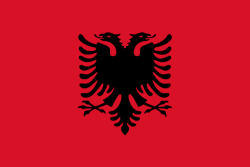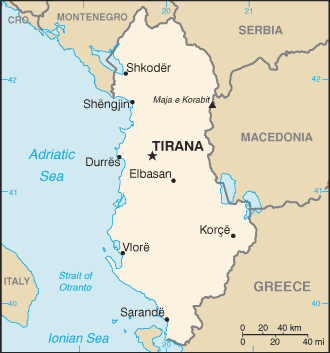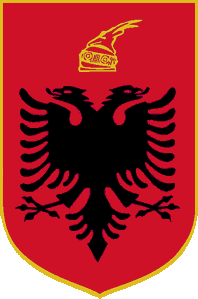Albania
Related Categories:
 Flag of Albania
Flag of AlbaniaRed with a black two-headed eagle in the center. |

 Albania Coat of Arms
Albania Coat of Arms |
Description and history of the flag, national emblem.
www.fotw.us/flags/al.html Albania - wikipedia.org
The lands that are today inhabited by Albanians were first populated in the Paleolithic Age (Stone Age), over one hundred thousand years ago.
en.wikipedia.org/
Over 90% of Albania's people are ethnic Albanian, and Albanian is the official language. Religions include Muslim (Sunni and Bektashi), Albanian Orthodox, and Roman Catholic.
Scholars believe the Albanian people are descended from a non-Slavic, non-Turkic group of tribes known as Illyrians, who arrived in the Balkans around 2000 BC. Modern Albanians still distinguish between Ghegs (northern tribes) and Tosks (southern tribes). After falling under Roman authority in 165 BC, Albania was controlled nearly continuously by a succession of foreign powers until the mid-20th century, with only brief periods of self-rule.
Following the split of the Roman Empire in 395, the Byzantine Empire established control over present-day Albania. In the 11th century, Byzantine Emperor Alexius I Comnenus made the first recorded reference to a distinct area of land known as Albania and to its people.
The Ottoman Empire ruled Albania from 1385-1912. During this time, much of the population converted to the Islamic faith, and Albanians also emigrated to Italy, Greece, Egypt and Turkey. Although its control was briefly disrupted during the 1443-78 revolt, led by Albania's national hero, Gjergj Kastrioti Skenderbeg, the Ottomans eventually reasserted their dominance.
The League of Prizren (1878) promoted the idea of an Albanian nation-state and established the modern Albanian alphabet, updating a language that survived the hundreds of years of Ottoman rule despite being outlawed. By the early 20th century, the weakened Ottoman Empire was no longer able to suppress Albanian nationalism. Following the conclusion of the First Balkan War, Albanians issued the Vlore Proclamation of November 28, 1912, declaring independence and the Great Powers established Albania’s borders in 1913. Albania's territorial integrity was confirmed at the Paris Peace Conference in 1919, after U.S. President Woodrow Wilson dismissed a plan by the European powers to divide Albania among its neighbors.
During the Second World War, Albania was occupied first by Italy (1939-43) and then by Germany (1943-44). After the war, Communist Party leader Enver Hoxha, through a combination of ruthlessness and strategic alliances, managed to preserve Albania's territorial integrity during the next 40 years, but exacted a terrible price from the population, which was subjected to purges, shortages, repression of civil and political rights, a total ban on religious observance, and increased isolation. Albania adhered to a strict Stalinist philosophy, eventually withdrawing from the Warsaw Pact in 1968 and alienating its final remaining ally, China, in 1978.
Following Hoxha's death in 1985 and the subsequent fall of Communism in 1991, Albanian society struggled to overcome its historical isolation and underdevelopment. During the initial transition period, the Albanian Government sought closer ties with the West in order to improve economic conditions and introduced basic democratic reforms, including a multi-party system.
In 1992, after the sweeping electoral victory of the Democratic Party, Sali Berisha became the first democratically elected President of Albania. Berisha began a more deliberate program of economic and democratic reform but progress on these issues stalled in the mid-1990s, due to political gridlock. At the same time, unscrupulous investment companies defrauded investors all over Albania using pyramid schemes. In early 1997, several of these pyramid schemes collapsed, leaving thousands of people bankrupt, disillusioned, and angry. Armed revolts broke out across the country, leading to the near-total collapse of government authority. During this time, Albania's already inadequate and antiquated infrastructure suffered tremendous damage, as people looted public works for building materials. Weapons depots all over the country were raided. The anarchy of early 1997 alarmed the world and prompted intensive international mediation.
A UN Multinational Protection Force restored order, and an interim national reconciliation government oversaw the general elections of June 1997, which returned the Socialists and their allies to power at the national level. President Berisha resigned, and the Socialists elected Rexhep Meidani as President of the Republic.
During the transitional period of 1997-2002, a series of short-lived Socialist-led governments succeeded one another as Albania's fragile democratic structures were strengthened. Additional political parties formed, media outlets expanded, non-governmental organizations and business associations developed. In 1998, Albanians ratified a new constitution via popular referendum, guaranteeing the rule of law and the protection of fundamental human rights and religious freedom. Fatos Nano, Chairman of the Socialist Party, emerged as Prime Minister in July 2002.
On July 24, 2002, Alfred Moisiu was sworn in as President of the Republic. A nonpartisan figure, he was elected as a consensus candidate of the ruling and opposition parties. The peaceful transfer of power from President Meidani to President Moisiu was the result of an agreement between the parties to engage each other within established parliamentary structures. This "truce" ushered in a new period of political stability in Albania, making possible significant progress in democratic and economic reforms, rule of law initiatives, and the development of Albania's relations with its neighbors and the U.S.
The "truce" between party leaders began to fray in summer 2003 and progress on economic and political reforms suffered noticeably due to political infighting. The municipal elections of 2003 and national elections of 2005 were an improvement over past years, adding to the consolidation of democracy despite the continued presence of administrative errors and inaccuracies in voter lists.
In 2005, the Democratic Party and its allies returned to power, pledging to fight crime and corruption, decrease the size and scope of government, and promote economic growth. Their leader, Sali Berisha, was sworn in as Prime Minister on September 11, 2005.
Since the election, PM Berisha’s Government has made the fight against corruption and organized crime its first priority and has begun administrative and legal reforms toward that end. This brought repeated clashes with the opposition, which condemned the government’s approach as unconstitutional and an attempt to undermine independent institutions. Both sides remain combative over a range of political and substantive issues.
www.state.gov/r/
Introduction
About
Contact
Symbols in The News
Interpret this Symbol
AAC
African
AI
Alchemy
Alphabets
Ancient
Animal Symbolism
Architecture
Art
Articles
Astrology
Baha'i
Blissymbolics
Blueprint Symbols
Buddhist
Celtic Symbols
Cemetery
Chinese Symbols
Christian
Circle
City
Codes
Color
Conlangs
Crop Circles
Danger
Da Vinci Code
Designing Logos
Dictionaries
Dreams
Education
Egyptian Symbols
Electrical
Emoticons
Find Images
Fonts
Food
Fraternity
Hamsa
Healing
Heraldry
Hermetic
Highway Signs
Hindu
History
Hobo
Holiday
Icons
iConji
Islamic
Jain Symbols
Japanese, Kanji
Jewish
Justice
Law
Literary Symbolism
Mandalas
Map
Masonic
Math, Number
Meaning of Names
Medical
Middle East
Military
Miscellaneous
Money
Music
Mythology
Native American
Playing Cards
Power
Psychology
QiQiiKhu
Reiki
Religious
Runes, Norse
Sacred Geometry
Scientific
Science Fiction
Sorority
Sports
Symbols in the News
Tattoos
ThirteenSymbols
Tree of Life
Ursprache
Videos
Visual Languages
Weather
Web Codes
Wicca
Words
Writing Systems
Braille
Coinherence
Coptic
Cuneiform
Easter Island
Etruscan
Happy Human
Hebrew
Kokopelli
Linear B
Lotus
Love Symbols
Mandorla
Moon Alphabet
Nine Pointed Star
Om
Oz
Phonetic
Scarab Beetle
Silent
Theosophy
Unifon
About
Contact
Symbols in The News
Interpret this Symbol
AAC
African
AI
Alchemy
Alphabets
Ancient
Animal Symbolism
Architecture
Art
Articles
Astrology
Baha'i
Blissymbolics
Blueprint Symbols
Buddhist
Celtic Symbols
Cemetery
Chinese Symbols
Christian
Circle
City
Codes
Color
Conlangs
Crop Circles
Danger
Da Vinci Code
Designing Logos
Dictionaries
Dreams
Education
Egyptian Symbols
Electrical
Emoticons
Find Images
Fonts
Food
Fraternity
Hamsa
Healing
Heraldry
Hermetic
Highway Signs
Hindu
History
Hobo
Holiday
Icons
iConji
Islamic
Jain Symbols
Japanese, Kanji
Jewish
Justice
Law
Literary Symbolism
Mandalas
Map
Masonic
Math, Number
Meaning of Names
Medical
Middle East
Military
Miscellaneous
Money
Music
Mythology
Native American
Playing Cards
Power
Psychology
QiQiiKhu
Reiki
Religious
Runes, Norse
Sacred Geometry
Scientific
Science Fiction
Sorority
Sports
Symbols in the News
Tattoos
ThirteenSymbols
Tree of Life
Ursprache
Videos
Visual Languages
Weather
Web Codes
Wicca
Words
Writing Systems
Braille
Coinherence
Coptic
Cuneiform
Easter Island
Etruscan
Happy Human
Hebrew
Kokopelli
Linear B
Lotus
Love Symbols
Mandorla
Moon Alphabet
Nine Pointed Star
Om
Oz
Phonetic
Scarab Beetle
Silent
Theosophy
Unifon
